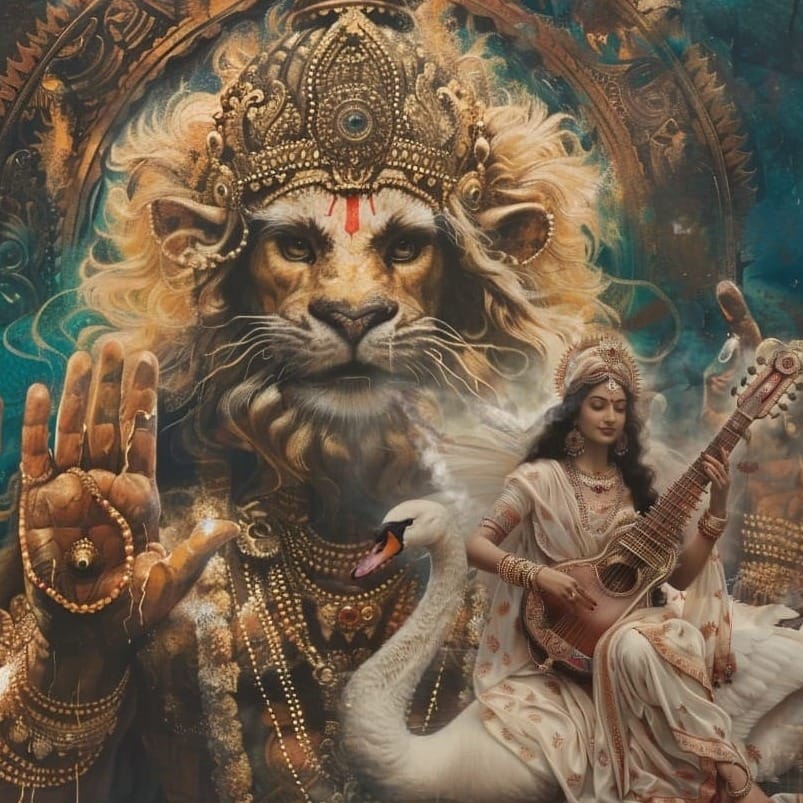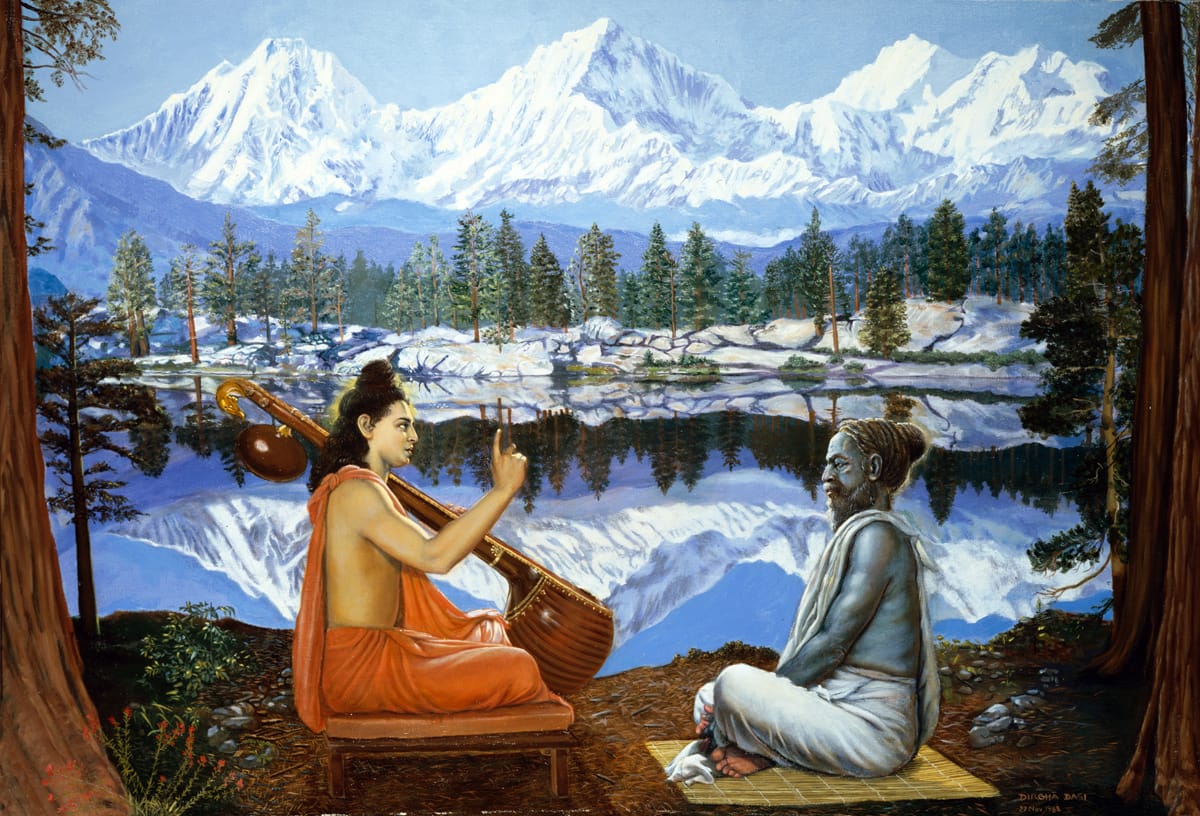Śrī Śrī Sarasvatī-Nṛsiṁha = the Immutable Letters of Vyāsa

śrī śrī guru-gaurāṅgau jayataḥ
The following consists of Śrīla Prabhupāda Bhaktisiddhānta Sarasvatī Ṭhākura’s introductory remarks in response to Vyāsa-pūjā glorifications (Year 4 of Gauḍīya, Issue 28–29, page 13) and then the entire Śrī Śrī Nṛsiṁha Stava by Śrī Śrīdhara Svāmipāda:
At the beginning of Bhārata [Mahābhārata], we pronounce the following as an invocation:
nārāyāṇaṁ namaskṛtya narañcaiva narottamam |
devīṁ sarasvatīṁ vyāsaṁ tato jaya udīrayet ||.”
Today we too sing the praises of Śrī Kṛṣṇa Dvaipāyana Vyāsa at the start of a new year.
Śrīmad Vyāsa’s worshipful deity is Śrī Nārāyaṇa. He is Puruṣottama Parama-puruṣa Mahāprabhu and His transcendental energy, the Rasa-mayī Sarasvatī Devī, is Nārāyaṇī. After offering obeisance to this couple, the eternal custom is to sing the praises of Śrī Gurudeva and Śrī Vyāsa. The grandsire of all realms and peoples, the human form of the Supreme Person and His direct representative, Caturmukha, is the initial instrument of the material creation.
The descendant of Śrī Viṣṇusvāmi-pāda, Śrīdhara, says:
“vāgīśā yasya vadane lakṣmīr yasya ca vakṣasi |
yasyāste hṛdaye saṁvit taṁ nṛsiṁham ahaṁ bhaje ||”
“Lord Nṛsiṁhadeva is always assisted by Sarasvatī, the goddess of learning, and He is always embracing the goddess of fortune to His chest. The Lord is always complete in knowledge within Himself. Let us offer obeisances unto Nṛsiṁhadeva.”
The original mahānta-guru, Śrī Caturmukha, bore the saṁvit-śakti of Śrī Nṛsiṁha within his heart and Sarasvatī spoke the four Vedas via Caturmukha. That is what Śrī Nārada heard. Śrī Nārada performed kīrtana of that and Śrī Vyāsadeva heard it. There are two praṇāli (systems) of cultivating focus on Puruṣottama Śrī Nārāyaṇa; one is a favourable modality, and the other is an unfavourable modality, and they both are expressed in a multitude of forms. For the benefit of his followers, Vyāsa referred to all these forms as ‘akṣara’ (that which is indestructible, letters of a script), thus eradicating kṣara-dharma (perishability) therefrom. Śrī Nṛsimha’s pastimes are the pastimes of that Viṣṇu who infused the wealth of transcendental splendor into the heart of the original poet, Brahmā. That is precisely why Śrī Viṣṇusvāmipāda Śrīdhara, in determining the svarūpa of his abhīṣṭadeva Śrī Nārāyaṇa, has manifested for his followers the akṣarātmikā-mūrtti (indestructible form, or divine word) of Narasiṁha as the means to have His darśana.
—Jagad-guru Śrīla Bhaktisiddhānta Sarasvatī Ṭhākura Prabhupāda

Śrī Śrī Nṛsiṁha-Stavaḥ
By Śrīla Śrīdhara Svāmi-pāda
jaya jayājita jahy aga-jaṅgamā-
vṛtim ajām upanīta-mṛṣāguṇām |
na hi bhavantam ṛte prabhavanty amī
nigama-gīta-guṇārṇavatā tava ||1||
O Ajita – The Undefeatable! All glories to You, I proclaim again and again! Kindly destroy the delusion that festers in false identification with the physical coverings of the living entities, moving and nonmoving. No one—neither jīva, nor demigod—can accomplish this feat. All the Vedic scriptures sing relentlessly of the ocean of Your virtues.
druhiṇa-vahni-ravīndra-mukhāmarā
jagad idaṁ na bhavet pṛthag utthitam |
bahu-mukhair api mantra-gaṇair ajas
tvam uru-mūrti-rato vinigadyase ||2||
Nothing and no one in this universe, not even the demigods led by Brahmā, Agni, Sūrya, and Indra, can come into being of its or their own accord. This is why the Vedas glorify You specifically as Aja – The Unborn, and Virāṭa-mūrti – The Form of The Totality.
sakala-veda-gaṇerita-sad-guṇas
tvam iti sarva-manīṣi-janā ratāḥ |
tvayi subhadra-guṇa-śravaṇādibhis
tava pada-smaraṇena gata-klamāḥ ||3||
The Vedas all expound upon the multitude of Your virtues. By hearing and singing of Your supremely auspicious qualities, all the most intelligent personalities in existence, who are deeply attached to You, become entirely freed of all torment as they remember Your lotus feet.
nara-vapuḥ pratipadya yadi tvayi
śravaṇa-varṇana-saṁsmaraṇādibhiḥ |
nara-hare na bhajanti nṛṇām idaṁ
dṛti-vad ucchvasitaṁ viphalaṁ tataḥ ||4||
O Nṛsiṁhadeva! If the living entity obtains the human form but does not engage in Your worship by hearing, chanting, and remembering, then the breaths it takes, inhaling and exhaling, are as lifeless as that of a blacksmith’s bellows.
udarādiṣu yaḥ puṁsāṁ cintito muni-vartmabhiḥ |
hanti mṛtyu-bhayaṁ devo hṛd-gataṁ tam upāsmahe ||5||
Following the path of great sages, the yogis meditate upon Lord Nṛsiṁhadeva as situated within the lotus-like chakras of the abdomen and other energetic centers, and Nṛsiṁhadeva destroys their fear of death thus. We, however, meditate upon him within the heart.
sva-nirmiteṣu kāryeṣu tāratamya-vivarjitam |
sarvānusyūta-san-mātraṁ bhagavantaṁ bhajāmahe ||6||
We worship that Śrī Bhagavān who is situated equally within all objects as the basis of existence itself regardless of the various functions He initiates, like cosmic creation, maintenance, and destruction.
tvad-aṁśasya mameśāna tvan-māyā-kṛta-bandhanam |
tvad-aṅghri-sevām ādiśya parānanda nivartaya ||7||
O Lord! O Supreme Bliss! Kindly bestow upon me service to Your two lotus feet and thus dispel the bondage wrought by Your māyā upon me, who am but one of Your infinitesimal emanations (vibhinnāṁśa).
tvat-kathāmṛta-pāthodhau viharanto mahā-mudaḥ |
kurvanti kṛtinaḥ kecic catur-vargaṁ tṛṇopamam ||8||
There are certain blessed individuals who are forever imbued with supreme bliss because they are prone to frolic in the ocean of Your nectareous glories and therefore they regard the four cherished achievements of mankind to be equal to pieces of straw.
tvayy ātmani jagan-nāthe man-mano ramatām iha |
kadā mamedṛśaṁ janma mānuṣaṁ sambhaviṣyati ||9||
In this very birth, may my consciousness become immersed in You, who are my Paramātmā, my Supersoul, and Jagannātha, the Lord of the Universe. When will I attain such a human birth wherein I become so entirely immersed in You.
caraṇa-smaraṇaṁ premṇā tava deva su-durlabham |
yathā kathañcin nṛ-hare mama bhūyād ahar-niśam ||10||
To remember Your sacred feet with prema is extremely rare. Nevertheless, O master, somehow or other let that remembrance of Your feet be mine day and night.
kvāhaṁ buddhy-ādi-saṁruddhaḥ kva ca bhūman mahas tava |
dīna-bandho dayā-sindho bhaktiṁ me nṛ-hare diśa ||11||
O Bhūman, the Abundant One! Just see where I am, a jīva enveloped in the antics of mind and ego, etc., compared to where Your glorious prowess is situated. O Nṛhare – Half Man, Half Lion! O Dīna-bandhu – Friend of the Fallen! Please bless me with devotion to You.
mithyā-tarka-sukarkaśerita-mahā-vādāndhakārāntara-
bhrāmyan-manda-mater amanda-mahimaṁs tvaj-jñāna-vartmāsphuṭam |
śrīman mādhava vāmana trinayana śrī-śaṅkara śrī-pate
govindeti muda vadan madhupate muktaḥ kadā syām aham ||12||
O You of infinite glory! To my sluggish intellect, which meanders about the ghastly, dark abyss of fallacies and extremely crude and opprobrious language, the pathway of Your tattva-jñāna, or true knowledge concerning You, is not illuminated. O Madhupate! O Mādhava! O Vāmana! O Trinayana! O Śaṅkara! O Śrīpate! When will I be delivered from this dark abyss as I continuously utter such names of Yours in utter delight?
yat sattvataḥ sadā bhāti jagad etad asat svataḥ |
sadābhaṣam asaty asmin bhagavantaṁ bhajāma tam ||13||
Because of His existence, this illusory world appears to be real and permanent. We worship that Śrī Bhagavān who is the presence of truth with this illusory realm.
tapantu tāpaiḥ prapatantu parvatād
aṭantu tīrthāni paṭhantu cāgamān |
yajantu yāgair vivadantu vādair
hariṁ vinā naiva mṛtiṁ taranti ||14||
Torture yourself and do a great deal of austerities or throw yourself from tall mountain-tops. Go wandering to many, many holy places or study all the scriptures. Perform many types of yajñas or become a logician and embroil yourself in debates. Without that remembrance of Śrī Hari, no one can conquer death.
anindriyo’pi yo devaḥ sarva-kāraka-śakti-dhṛk |
sarva-jñaḥ sarva-kartā ca sarva-sevyaṁ namāmi tam ||15||
I bow unto He who, though without material sense faculties, bears all power of agency and is omniscient. He is the doer of all deeds and the object of all service. I bow unto Him.
tvad-īkṣaṇa-vaśa-kṣobha-māyā-bodhita-karmabhiḥ |
jātān saṁsarataḥ khinnān nṛ-hare pāhi naḥ pitaḥ ||16||
O Narasiṁha! O Father! It is by Your glance that māyā is controlled and stimulated, whereby all the functions of the world are awakened. Please protect us, who are born in embodied life in this material existence and tormented by it.
antaryantā sarva-lokasya gītaḥ
śrutya yuktyā caivam evāvaseyaḥ |
yaḥ sarva-jñaḥ sarva-śaktir nṛsiṁhaḥ
śrīmantaṁ taṁ cetasaivāvalambe ||17||
In the Vedas, He is renowned as the indwelling witness of all beings, and even through reasoning, He is known as such. With the entirety of my consciousness, I take the shelter and support of that omniscient and omnipotent Śrī Nṛsiṁhadeva accompanpied by Śrīmal-Lakṣmī.
yasminn udyad-vilayam api yad bhāti viśvaṁ layādau
jīvopetaṁ guru-karuṇayā kevalātmāvabodhe |
atyantāntaṁ vrajati sahasā sindhu-vat sindhu-madhye
madhye cittaṁ tri-bhuvana-guruṁ bhāvaye taṁ nṛsiṁham ||18||
Even at the dissolution of Creation, the whole world and all living beings abide in luminous existence within Him, and in much the same way, when, by His profuse mercy, the living entities realize the true, immaculate forms of their souls, then like rivers finally rushing into the ocean, those entities attain supreme salvation, the complete cessation of all misery, and become situated in Your divine abode. I meditate upon that Śrī Nṛsiṁhadeva, who is the guru of the three worlds.
saṁsāra-cakra-krakacair vidīrṇaṁ
udīrṇa-nānā-bhavatāpataptam |
kathañcid āpannam iha prapannaṁ
tvam uddhara śrī-nṛhare nṛ-lokam ||19||
O Śrī Narahare – Savior of Mankind! Please deliver these human beings who have taken shelter of You. They have been torn apart by the sawblades of cyclical material existence, scorched by varieties of miseries in this world, and are always in some manner of predicament.
yadā parānanda-guro bhavat-pade
padaṁ mano me bhagavaṁl labheta |
tad nirastākhila-sādhana-śramaḥ
śrayeya saukhyaṁ bhavataḥ kṛpātaḥ ||20||
O Lord! When my mind finally attains the shelter of Your lotus feet, then, O divine teacher of supreme bliss, by your infinite mercy, the toil of all manner of sādhana will be alleviated and I will attain supreme happiness.
bhajato hi bhavān sākṣāt paramānanda-cid-ghanaḥ |
ātmaiva kim ataḥ kṛtyaṁ tuccha-dāra-sutādibhiḥ ||21||
To those who engage in hari-bhajana, You are the direct, tangible Supersoul who is comprised of supreme, divine, condensed bliss. What then is the point of having such insignificant things as wives, children, etc.?
muñcann aṅga tad-aṅga-saṅgam aniśaṁ tvām eva sañcintayan
santaḥ santi yato yato gata-madās tān āśramān āvasan |
nityaṁ tan-mukha-paṅkajād vigalita-tvat-puṇya-gāthāmṛta-
srotaḥ-saṁplava-saṁpluto nara-hare na syām ahaṁ deha-bhṛt ||22||
O Nṛsiṁha! There are saints who have given up attachment to the company of their children and wives and incessantly contemplate only You, thus becoming free from all manner of vice, like conceit. I will stay in the āśramas where such saints live and become bathed in the current of the sacred, nectareous descriptions of You that are melting forth from their mouths. Thus I will never again become a bearer of a material body.
udbhūtaṁ bhavataḥ sato’pi bhuvanaṁ san naiva sarpaḥ srajaḥ
kurvat kāryam apīha kūṭa-kanakaṁ vedo’pi naivaṁ paraḥ |
advaitaṁ tava sat-paraṁ tu paramānandaṁ padaṁ tan mudā
vande sundaram indirānuta hare mā muñca mām ānatam ||23||
Just as the appearance of a snake perceived in a flower garland is not true, though the world arises from You, the eternal reality, it is not sat, or eternal. Though gold may take shape as various ornaments, its constitution remains unaltered. But the Vedas are not like that. In other words, even the purport of the Vedas is contrived when perceived through the lens of a secondary interpretation. But Your advaita (peerless) state of being is eternal truth. Therefore, I delightedly venerate Your beautiful and supremely blissful feet. O You who are glorified and served by Ramā-devī! O Hare! Have mercy on this surrendered soul and do not discard me.
mukuṭa-kuṇḍala-kaṅkaṇa-kiṅkiṇī-
pariṇataṁ kanakaṁ paramārthataḥ |
mahad-ahaṅkṛti-kha-pramukhaṁ tathā
nara-harer na paraṁ paramārthataḥ ||24||
Though gold may be transformed in crowns, earrings, bangles, and girdles, it is still just gold. Likewise, the raw material totality (mahat), the ego, space, and other such elements are in reality not different from Śrī Nṛsiṁhadeva.
nṛtyantī tava vīkṣaṇāṅgaṇa-gatā kāla-svabhāvādibhir
bhāvān sattva-rajas-tamo-guṇa-mayān unmīlayantī bahūn |
mām ākramya padā śirasy atibharaṁ saṁmardayanty āturaṁ
māyā te śaraṇaṁ gato’smi nṛ-hare tvam eva tāṁ vāraya ||25||
Māyā-devī receives Your glance and begins to dance. As she carries on dancing, she utilizes time, nature, and other implements to produce many states of being composed of the three material modes of sattva, raja, and tama. Thus she has attacked this tormented creature and is cruelly kicking me in the head. O Narahare! I have become surrendered to You! O Master! Kindly alleviate the influence Your Māyā has on me.
daṇḍa-nyāsa-miṣeṇa vañcita-janaṁ bhogaika-cintāturaṁ
saṁmuhyantam ahar-niśaṁ viracitodyoga-klamair ākulam |
ājñā-laṅghinam ajñam ajña-janatā-saṁmāna-nāsan madaṁ
dīnā-nātha dayā-nidhāna paramānanda prabho pāhi mām ||26||
O reservoir of compassion for the fallen and orphaned! O Paramānanda – Supreme Bliss! Though I have accepted sannyāsa and a daṇḍa, I am someone who has been cheated and deceived, tormented as I am by my contemplations of sense gratification. Day and night I am being gripped by extreme delusion. I am fraught with anxiety due to the suffering I am reaping from my own deeds. I habitually disobey the orders of saints and the holy scriptures. I am intoxicated with the respect that the ignorant public give me. O master! Protect me!
avagamaṁ tava me diśa mādhava
sphurati yan na sukhāsukha-saṅgamaḥ |
śravaṇa-varṇana-bhāvam athāpi vā
na hi bhavāmi yathā vidhi-kiṅkaraḥ ||27||
O Mādhava! Please bless me with Your tattva-jñāna and the loving attachment to hearing and performing kīrtana of that sacred knowledge, whereby I will neither be touched by the joys and sorrows produced by sense objects, nor will I be a slave to loveless strictures.
dyu-patayo vidurantam ananta te
na ca bhavān na giraḥ śruti-maulayaḥ |
tvayi phalanti yato nama ity ato
jaya jayeti bhaje tava tat padam ||28||
O Ananta – The Infinite! The demigods do not know where it is that You end. You also do not know Your end. This is why all the essential statements of the Vedas reach their maturity in the course of determining the truth of Your being, Your tattva. Therefore, I worship Your rarely attained feet with statements like “I bow to You” and “Glory be to You, glory be to You”
sarva-śruti-śiro-ratna-nīrājita-padāmbujam |
bhoga-yoga-pradaṁ vande mādhavaṁ karmi-namrayoḥ ||29||
I offer my obeisance unto that Śrī Mādhava whose lotus feet, which grant material enjoyment to the karmī and bhakti-yoga to the bhakta, are worshipped by the crown jewels of all the Vedas.
namaste narasiṁhāya prahlādāhlāda-dāyine
hiraṇyakaśipor-vakṣaḥ śilāṭaṅka-nakhālaye
I offer my obeisance to that Narasiṁha who gives delight to Śrī Prahlāda, whose nails are chisels upon the stone-like chest of Hiraṇyakaśipu.
ito nṛsiṁhaḥ parato nṛsiṁho yato yato yāmi tato nṛsiṁhaḥ
bahir nṛsiṁho hṛdaye nṛsiṁho nṛsiṁham ādiṁ śaraṇaṁ prapadye
(Śrī Nṛsiṁha Purāṇa)
Śrī Nṛsiṁhadeva is here, Śrī Nṛsiṁhadeva is there—wherever I go, Śrī Nṛsiṁhadeva is there. Śrī Nṛsiṁhadeva is outside me, Śrī Nṛsiṁhadeva is in my heart. I have surrendered myself unto that original Person, Śrī Nṛsiṁhadeva.
vāgīśā yasya vadane lakṣmīr yasya ca vakṣasi
yasyāste hṛdaye samvit taṁ nṛsiṁham ahaṁ bhaje
(Śrī Bhāvārtha Dīpikā)
In His mouth, dwells Sarasvatī Devī, on His chest dwells Lakṣmī Devī, and in His heart is the totality of pure, divine cognition (samvit). I worship that Śrī Nṛsiṁhadeva.
